

Articles

The Marriage of a Reason on the Chinese Background. The Painted Veil
Grażyna Stachówna in her essay states that the marriage love awakened only after getting married, surprisingly hot and romantic, is one of the consoling melodramatic myths. In this way a society secured the institution of marriage as a cold, calculated, economical and business-like case. Rather seldom has such love been the theme of great literature. In popular literature it has appeared more often, while in the cinema this theme has always been present. William Somerset Maugham’s novel The Painted Veil consists of this topic. It is not a melodramatic work, rather psychological one with strong moral and didactical accents. The plot of the novel resembles a little that of Flaubert’s history of Emma Bovary. Maugham’s heroine was forced to marry a man who she finds indifferent and strange. The woman gets involved into a love affair that leads to marriage crisis. However, the latter with some other factors, surprisingly transforms itself into the triumph of love – the heroine falls deeply in love with her husband. After his death she decides to be a lonely mother and an independent woman. Maugham’s work is a classical novel about the eternal triangle. But looking at it psychoanalytically we can see in the heroine the mirror of the homosexual desire. Two men – the husband and the lover – at the overt level of the narration are connected with one another by love and jealousy towards one woman, but at the latent level they are significant figures of the homosexual fantasy of the novelist, who was a homosexual man involved in heterosexual marriage. The aura of death in the novel is strictly connected with the motive of forbidden homosexual love. Maugham’s novel has so far been adapted into screen three times. In the 1934 version by Ryszard Bolesławski the main role was played by Greta Garbo and the entire movie was just made for her. She, the great film star, is the main object to see and contemplate. The film is a typical Hollywood exotic melodrama, as terrible trash – “so manifesting that almost impressive”. In 1957 the second adaptation of Maugham’s novel was made by Ronald Neame. The latest of the three adaptations is a film by John Curran realized in 2006. It is an elegant melodrama in a good taste – a touching story that takes place in exotic sceneries, showed in beautiful takes, with stylized costumes, nostalgic music and with the stars in the main roles. Curran’s film demonstratively leaves Maugham’s novel’s message and inscribes itself totally in the Hollywood, melodramatic scheme. There is nothing distressing in it, no trace of “homosexual imagination”. Tao, the wisdom of the East, which is so important for the spiritual development of the novel’s heroine, does not count in Curran’s movie either. It is just a pleasant and stylish melodrama in a fine taste happening on the exotic background. An elegant and touching film made for women. “The director did not appear courageous or ironical enough to hide in his movie something more than a banal feministic message” – writes in her article Grażyna Stachówna.